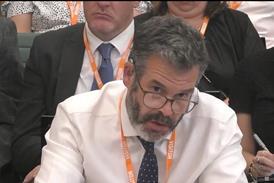Law firms are expected to be in the line of fire when the government announces a new crackdown today on money-laundering in the UK. Security minister Ben Wallace will set out plans for the new multi-agency national economic crime centre to prioritise the most serious offenders.
In an interview with the Guardian, Wallace said the focus will be on the likes of high street solicitors, public schools and football clubs, who will be expected to report irregularities.

He told the newspaper this crackdown would mean going after facilitators ‘at the front of the queue’.
Wallace told the Guardian: ‘The ones who pretend their hands aren’t really dirty and profit from moving dirty money and knowingly conspire … they’re cowards to pretend they’re nothing really to do with it. They are the ultimate.
‘It’s like the McMafia programme, they comfort themselves by being at wonderful events and not getting their hands dirty, but their hands are as dirty as the person trafficking the child that they’re making their money from.’
The newspaper reports that the government has held talks with the regulatory bodies for property, accountancy and law to urge them to do more to root out illicit activity.
In its latest risk update, the Solicitors Regulation Authority notes a 67% rise in money laundering reports since 2016, with 60 in the first quarter of 2018 compared with 36 at the end of 2016.
Legal professionals submitted less than 1% of the total suspicious activity reports (SARs) to the National Crime Agency in 2017.
Writing today in the Telegraph, Bob Wigley, chairman of financial services representative body UK Finance, said the government must ensure the right technology and legal and regulatory framework to combat organised crime.
‘We know they target and exploit current gaps in data sharing in order to launder money and defraud customers,’ he said. ‘So we need further legal reform to help disrupt illicit funds and are calling for new powers to allow public and private sectors to share data to detect and prevent financial crime better.’




























34 Readers' comments